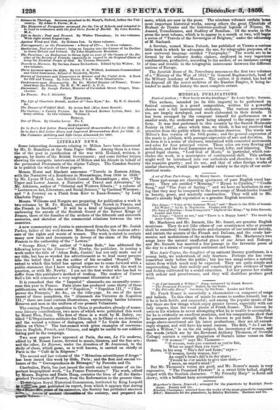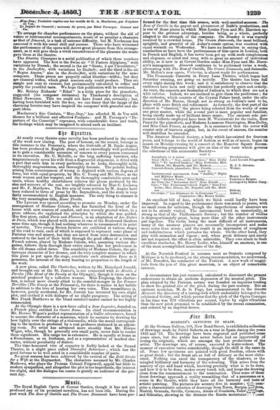MUSICAL PUBLICATIONS.
Festival Anthem ; " Bow lovely are thy dwellings." By Louis Spobr. snrman.
This anthem, intended (as its title imports) to be performed MI festival occasions, is a grand composition, written for a powerful chorus and a full instrumental orchestra. The various movements, too, are largely developed, and much elaborated in their details. It has been arranged by the composer himself for performance on a smaller scale, the orchestral parts being adapted to the organ or piano- forte. It was first performed in this country by the Sacred Harmonic Society in 1847 , since which time, we think, it has not received that attention from the public which its excellence deserves. The words are Milton's fine version of the 84th psalm; and the general expression of the music is jubilant, with passages expressive of awe and devotion. In its form it is a series of choruses, intermixed with concerted movements and solos for four principal voices. These solos are very flowing and melodious, and the vocal harmonies are broad, lofty, and imposing. The grand fugal chorus, "Lord God of Hosts," in particular, which con- cludes the work, is a masterpiece of contrapuntal skill. This anthem might well be introduced into our cathedrals and churches : it has all the requisite gravity; and its use, and that of other foreign works of similar character, would impart needful variety to the style of our eccle- siastical music.
A set of Four Part-Songs. By Henry Smart. Cramer and Co.
These part-songs are charming specimens of pure English vocal har- mony. They are entitled " Morning," " Hymn to Cynthia," " Cradle Song," and " The Joys of Spring :" and we have no hesitation in say- ing that they may be compared to the part-songs of Mendelssohn himself in beauty, grace, and masterly construction. They will add to Mr. Smart's already high reputation as a genuine English musician.
Two Songs; " Voice of the Summer Wind," and " Haste to the Hills of beauti- ful Wales ; " by G. A. Macfarren. Cramer and Co. The Song of Fortune: front Tennyson's " Idylls of the King ; " by John Barnett. Leader and Cock.
Two Songs ; " Leave us not," and " There is a Happy Land." The music by Arnie Coyne. 011ivier.
Mr. Macfarren and Mr. Barnett, like Mr. Smart, are genuine English musicians. They do not (like others of our countrymen who at present shall be nameless) forsake the style and character of our national melody, and imitate the accents of the French and Italians, and the crude har- monies and modulations of the modern Germans. Mr. Macfarren's two songs have the natural unaffected grace of our Arnes and Bishops ; and Mr. Barnett has married a fine passage in the favourite poem of the day to a strain of congenial sentiment and beauty.
Miss Arnie Coyne, the daughter of an eminent literary gentleman, is a young lady, we understand, of only fourteen. Perhaps she has come somewhat early before the public ; but her two songs evince a natural talent from which much may be expected. They are quite simple and unpretending, but their melody and construction give evidence of taste and feeling cultivated by a sound education. Let her pursue her studies with ardour and perseverance, and they will doubtless produce good fruit.
"As I sat beneath a Willow." Song, composed by Frank Romer.
" The Promised Flowers." Ballad, by the Same. "My Friendly Harp." Cavatina, by the Same. Leader and Cock.
Mr. Frank Romer is essentially a chansonnier—a composer of songs and ballads. To this class of music he seems to confine himself, but in it he is both fertile and successful; and among the popular music of the day there are few things which enjoy greater favour, especially with our lady singers, than the vocal pieces of Frank Romer. This success he owes to his wisdom in never attempting what he is unable to accomplish; for he is evidently an excellent musician, and his compositions show that he possesses greater strength than he chooses to put forth. The three songs above-mentioned are his latest productions : they are all exceed- ingly elegant, and will have his usual success. The first, " As I sat be- neath a Willow," is on the old subject, the inconstancy of woman, and the words (which are by the Reverend Anthony Thomson, of Greville College) contain a curious plagiarism of Burns's bitter verses on that theme. " 0 woman !" says Mr. Thomson-
" 0 woman, were you constant as you're fair, What an angel then you were!" Burns, in his song " She's fair and fause," says- " 0 woman, lovely woman, fair? An. angers form's fall'n to thy share;
'Twould be o'er mickle to give thee mair,—
I mean, an angel's mind !"
But Mr. Thomson's verses are good, and Mr. Romer's music is very expressive. " The Promised Flowers" is a sweet little ballad, slightly tinged with the Scottish character. " My Friendly Harp " is florid and showy, with a brilliant harp accompaniment.
Meyerbeer's Opera, Dinorah ; arranged for the pianoforte by Rudolph Nord- mann. Boosey and Co. Bluettes Classigues ; selected from the works of the great pianoforte composers. Ethel ; Romance for the pianoforte, by Brinley Richards. Davison and Co.
May-Day; Fantaisie caprice sur les motifs de G. A. Macfarren, par Polydore de Vos.
Le Depart du Conscrit ; morcean de genre, par Rene Favarger. Cramer and co.
To arrange for chamber performance on the piano, without the aid of voices or instrumental accompaniments, music of so peculiar a character as that of Dinorah, is a task of extreme difficulty, but M. Nordmann has executed it with his usual skill and success. Those who have witnessed the performance of the opera will derive great pleasure from this arrange- ment, as it will give them a vivid remembrance of the pleasure the music gave them at the theatre.
The Bluettes Classigues is a serial publication of which three numbers have appeared. The first is the Swiss air " A Pastore Alpigiano," with variations by Dussek; the second is the air " Gente, 6 qui ruccellatore," in the Zauherfnite, with variations by Steibelt; and the third is the air " Regna Amore," also in the Zauberffete, with variations by the same composer. These pieces are properly called bluettes—trifles ; but they are classical trifles, which great masters only could produce. They are simple and easy to execute, but preeminently calculated to refine and purify the youthful taste. We hope this publication will be continued.
Mr. Brinley Richards' "Ethel" is a little piece for the pianoforte, suggested (the composer intimates) by Thackeray's description of Ethel Newcome. This we could not have found out, certainly; but, having been furnished with the key, we can fancy that the image of the charming heroine may have inspired the composer with graceful and ele- gant ideas.
Macfarren's fine Cantata, "May-Day," has afforded M. de Vos with themes for a brilliant and effective Fantasia : and M. Favarger's "De- parture of the Conscript" expresses, with considerable force and truth, the feelings which may be imagined to attend such an incident.



























 Previous page
Previous page